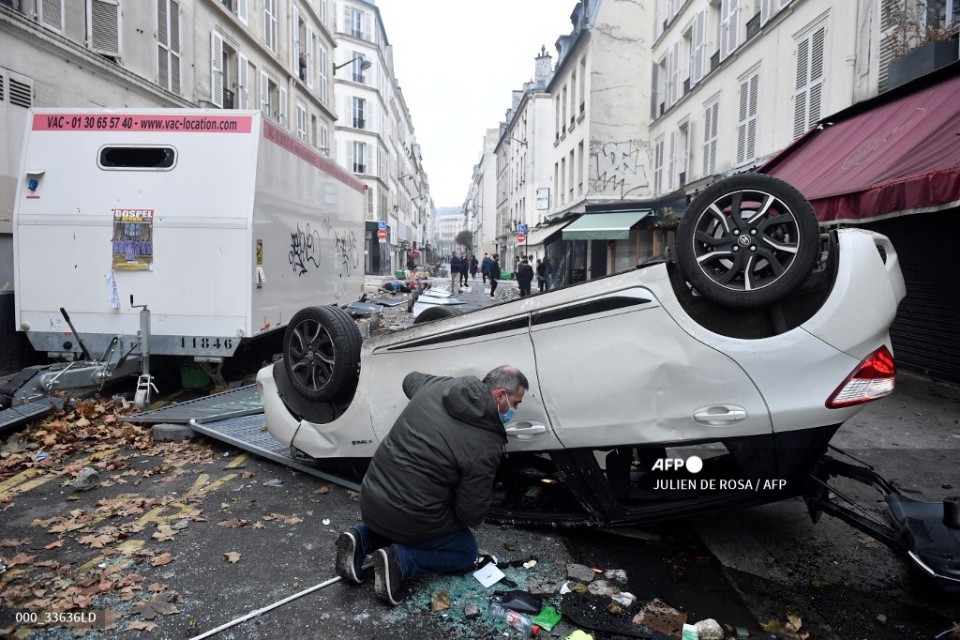
Paris, France (AFP) by Alexandre HIELARD / Murielle KASPRZAK
A 69-year-old white French gunman who opened fire at a Kurdish cultural centre in Paris killing three people told investigators he was racist, a source close to the case said Saturday.
The shots at the centre and a nearby hairdressing salon shortly before midday on Friday caused panic in the bustling 10th district of the French capital, home to several shops and restaurants and a large Kurdish population.
Three others were wounded in the attack that the gunman attributed to his being “racist”, the source said.
He was found with a case loaded with a box of at least 25 cartridges and “two or three loaded magazines”, the source added.
The weapon was a “much-used” US Army Colt 1911 pistol.
On Saturday morning, the Paris prosecutor extended the gunman’s period of detention for 24 hours and gave an extra charge of acting with a “racist motive”.
He is already being held on suspicion of murder, attempted murder, armed violence and violating weapons legislation.
French President Emmanuel Macron said “the Kurds in France have been the target of an odious attack in the heart of Paris” and ordered the Paris police chief to meet with leaders of the Kurdish community on Saturday.
The gunman, who has a history of racist violence, initially targeted the Kurdish cultural centre before entering a hairdressing salon where he was arrested.
Of the three wounded people, one was being given intensive care in hospital and two were treated for serious injuries.
According to the Kurdish Democratic Council in France (CDK-F), the dead included one woman and two men.
Emine Kara was a leader of the Kurdish Women’s Movement in France, the organisation’s spokesman Agit Polat said. Her claim for political asylum in France had been rejected.
The other victims were Abdulrahman Kizil and Mir Perwer, a political refugee and artist, according to the CDK-F.
A police source confirmed that Kara and Kizil were among the victims.
– ‘He is crazy’ –
The Kurdish community centre, called Centre Ahmet Kaya, is used by a charity that organises concerts and exhibitions, and helps the Kurdish diaspora in the Paris region.
Hundreds of Kurds gathered at Place de la Republique in central Paris on Saturday afternoon where they held a minute of silence for the three killed and those “who died for freedom”.
“What we feel is pain and disbelief because this is not the first time this has happened,” 23-year-old student Esra told AFP.
Three Kurdish women activists were killed in 2013 in the same area of Paris that deeply shook the Kurdish diaspora in France.
Within hours of Friday’s attack, Kurdish protesters clashed with police, who used tear gas in an attempt to disperse them as they tried to break through a police cordon deployed to protect Interior Minister Gerald Darmanin, who had arrived at the scene.
Demonstrators threw objects at police while voicing fury over an attack they saw as deliberate, and which they said French security services had done too little to prevent.
CDK-F spokesman Polat described the shooting as a “terrorist” attack.
Several cars parked in the area as well as police vehicles had their windows smashed as protesters threw bricks.
The shooter — named as William M. in the French media — is a gun enthusiast with a history of weapons offences who had been released on bail earlier this month.
The retired train driver was convicted for armed violence in 2016 by a court in the multicultural Seine-Saint-Denis suburb of Paris, but appealed.
A year later he was convicted for illegally possessing a firearm.
Last year, he was charged with racist violence after allegedly stabbing migrants and slashing their tents with a sword in a park in eastern Paris.
“He is crazy, he’s an idiot,” his father was quoted as saying by the M6 television channel.
Often described as the world’s largest people without a state, the Kurds are a Muslim ethnic group spread across Syria, Turkey, Iraq and Iran.
© Agence France-Presse








